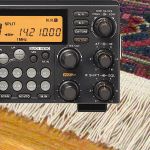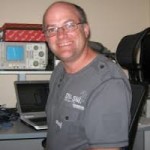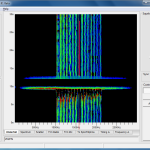Posts Tagged ‘freedv’
 LHS Episode #147: Radio on the Fringe
LHS Episode #147: Radio on the Fringe
 Hello, LHS listeners! We are back again with another exciting installment of our show. In this episode we discuss logging, general purpose and contesting, a new single-board computer project, retro gaming, a pop-up terminal for Linux, digital voice, software defined radio and much more. Thanks for listening, and remember: Get on the air!
Hello, LHS listeners! We are back again with another exciting installment of our show. In this episode we discuss logging, general purpose and contesting, a new single-board computer project, retro gaming, a pop-up terminal for Linux, digital voice, software defined radio and much more. Thanks for listening, and remember: Get on the air!
73 de The LHS Guys
 LHS Episode #145: Screaming Peanuts
LHS Episode #145: Screaming Peanuts
 Hello, friends! We're back with another fine episode of Linux in the Ham Shack. In this episode, we tackle topics like digital voice, the release of the 4.0 Linux kernel, installing or running Linux from a thumb drive, and a few rants from the peanut gallery. Please enjoy, and come back in a couple weeks for the next one!
Hello, friends! We're back with another fine episode of Linux in the Ham Shack. In this episode, we tackle topics like digital voice, the release of the 4.0 Linux kernel, installing or running Linux from a thumb drive, and a few rants from the peanut gallery. Please enjoy, and come back in a couple weeks for the next one!
73 de The LHS Guys
 LHS Episode #138: Being David Rowe
LHS Episode #138: Being David Rowe
 How about that: It's the first episode of Linux in the Ham Shack for 2015! We hope everyone is having a great new year so far. In this episode, we talk with David Rowe, VK5DGR, of Adelaide, South Australia. David is an audio engineer, Ph.D. scholar, inventor of Codec2 and co-author of FreeDV, among his many accolades. We talk to David about his projects, Linux, amateur radio, life in Australia, LinuxConf AU, the new SM1000 FreeDV device, the amount of energy it takes to make a Krispy Kreme donut, home built electric cars, and much more. Until next time...
How about that: It's the first episode of Linux in the Ham Shack for 2015! We hope everyone is having a great new year so far. In this episode, we talk with David Rowe, VK5DGR, of Adelaide, South Australia. David is an audio engineer, Ph.D. scholar, inventor of Codec2 and co-author of FreeDV, among his many accolades. We talk to David about his projects, Linux, amateur radio, life in Australia, LinuxConf AU, the new SM1000 FreeDV device, the amount of energy it takes to make a Krispy Kreme donut, home built electric cars, and much more. Until next time...
73 de The LHS Guys
 LHS Episode #137: Bacon Wins
LHS Episode #137: Bacon Wins
 Greetings, salutations and happy holidays! Today your weary hosts (minus one) bring you some great information about great topics, like: Why you should avoid qrznow.com, why you should upgrade your WordPress installation, why you should try ElementaryOS, why the government is like a turtle, and why bacon renders your argument invalid. Be well, listen often, and stay safe.
Greetings, salutations and happy holidays! Today your weary hosts (minus one) bring you some great information about great topics, like: Why you should avoid qrznow.com, why you should upgrade your WordPress installation, why you should try ElementaryOS, why the government is like a turtle, and why bacon renders your argument invalid. Be well, listen often, and stay safe.
73 de The LHS Guys
 FreeDV
FreeDV
FreeDV has received a fair degree of publicity recently and is a GUI application for Windows, Linux and MacOS (other platforms are in development) that allows any single side band radio to be used for low bit rate digital voice communication.
I was primarily interested in it for possible use on VHF. It is hoped that the recently introduced 146-147MHz allocation available in the UK to full licence holders (via a Notice of Variation) will be used for digital mode experimentation. I have been constructing a data mode interface for use on the old TR9000 since it can operate on these frequencies but I decided to try the FT857D on HF to get an understanding of the program.
With FreeDV speech is compressed down to 1600 bit/s then modulated onto a 1.25 kHz wide 16QPSK signal which is sent to the mic input of a SSB radio. On receive, the signal is received by the SSB radio, then demodulated and decoded by FreeDV. The appeal being communications should be readable down to 2 dB S/N, and long-distance contacts should be possible using QRP power.
There is a lot of information. videos and guides available on the FreeDV website but the basics are straightforward. The computer requires two sound cards to handle the audio to and from the radio and the speaker/headphones and microphone. One method is to use a USB 'gamer' headset but since I already had a spare PC headset with 3.5mm plugs I opted for a cheap plug in USB soundcard (as detailed below)
Once the audio devices and PTT control are installed and configured within FreeDV it is a matter of monitoring a frequency (in USB) and hopefully you can send and receive.
So far I have only managed two QSOs with Trygve (LA6UOA) and Fabrice (F4FPG) on 14.236MHz with both the audio was clearly understandable but did suffer from the odd breakup and stutter. This was probably due to the laptop being used rather than an issue with the signal as the FreeDV needs a reasonably powerful machine with a decent amount of memory.
The software is very picky, several times the audio device settings have been forgotten or it has come up with a cryptic error message:
../src/msw/bitmap.cpp(846):assert "image.IsOk()" failed inThis is a known issue with the Windows version and the solution is to manually remove all of the FreeDV settings from the registry. The full details of how to edit the registry are in the GOTCHA section of the FreeDV site. Editing the registry is not recommended to the inexperienced person so is not a great solution and when starting the program backup after this fix requires reconfiguration of callsign, sound card and PTT settings again.
CreateFromImage(): invalid image
Despite this setback it is an excellent and exciting new mode. Both Trygve (LA6UOA) and myself were first timers when we had our QSO and we were like excited school children once we were able to converse successfully. Fabrice (F4FPG) was an old hand at it and I thank him for allowing me to briefly interrupt a QSO he was having with another UK operator who I could not hear.
I would recommend using K7VE's QSO Finder website http://qso.k7ve.org/ to see who is monitoring and on what frequency as well as passing hints in real time.
 LHS Episode #136: Introduction to FreeDV
LHS Episode #136: Introduction to FreeDV
 Hello, everyone! We are back again with another fun and informative episode of Linux in the Ham Shack. In this episode, your hosts discuss solar flares, lots of space weather, stable and easy-to-install Linux distributions, H.R. 4969, Quentin Tarantino, dinner rolls and the amazing and fun new transmission mode for HF known as FreeDV. Don’t miss a second of this action-packed episode.
Hello, everyone! We are back again with another fun and informative episode of Linux in the Ham Shack. In this episode, your hosts discuss solar flares, lots of space weather, stable and easy-to-install Linux distributions, H.R. 4969, Quentin Tarantino, dinner rolls and the amazing and fun new transmission mode for HF known as FreeDV. Don’t miss a second of this action-packed episode.
73 de The LHS Guys
 Show Notes @#100
Show Notes @#100
Introduction:
- Promo: Listen to the Linux Basement Podcast.
- Happy Birthday, Richard!
- Yes, folks, it’s episode 100 of Linux in the Ham Shack. We’re now eligible for syndication!

Topics:
- In celebration of our 100th episode, several of our listeners in the chat room call in and participate in a roundtable discussion. Participants include Harrison (VE2HKW), Brian (K5BPC), and Jon (KT4KB). Unfortunately, noise on Jon’s connection prevented him from staying on the line.
- We received voice messages from listeners Michelle, Joy, Rich (KD0RG), Doug (N6LMX), Nick, Jon, “Major J”, and Harrison (VE2HKW).
- Feedback from Matt (KD8SZG), who asks which would be a better choice for a new HF user: a used IC-7000 or new FT-857D. The consensus is to choose the new FT-857D.
- Jon, KT4KB, asks how Russ and Richard met.
- Richard makes a shocking announcement!
- We have a short discussion of FreeDV vs. D-STAR, followed by a brief discussion of various Linux distributions.
- Richard makes a few final comments.
Contact Info:
- Contact Richard at [email protected], Russ at [email protected], or both at the same time at [email protected].
- Listen to the live stream every other Tuesday at 8:00pm Central time. Check the LHS web site for dates.
- Leave us a voice mail at 1-909-LHS-SHOW (1-909-547-7469), or record an introduction to the podcast.
- Sign up for the LHS mailing list.
- Sign up for the MAGNetcon mailing list.
- LHS merchandise is available at the Merch link on Web site. Check out the Badgerwear or buy one of the other LHS-branded items at PrintFection.com/lhs or Cafe Press. Thanks!
- Thanks to Dave from Gamma Leonis for the theme music.
Music:
- Gun Slinger by Daniel Worth.












